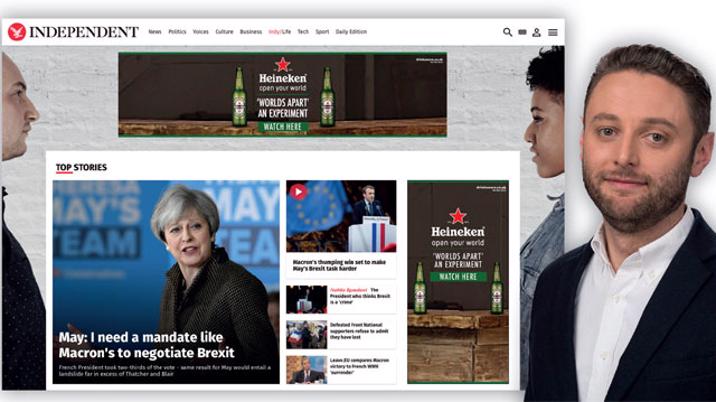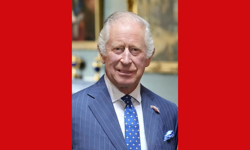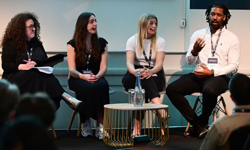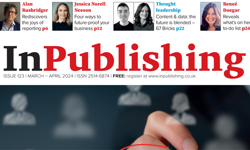
Christian Broughton seemed like a man relieved of a particularly heavy burden. There was a spring in his step. A year ago, he reminded us, the Independent had stopped the presses and gone digital only. It was a mercy killing – motivated, he said, by a deep-rooted love for the Independent brand. They had killed it to give it life. Something like that, anyway.
The twelve months since then had been highly successful: the title was making a profit for the “first time in decades”, the editorial team had doubled in size and was growing still, they were seeing big audience growth, particularly in the US, which now accounted for a third of its audience (the UK being another third, and the rest of the world making up the remainder). To paraphrase, it’s all good.
What then are the pillars of the Independent’s new found success? Listening to his keynote address, and to the panel discussion afterwards, I came away with five key messages:
1. Have a distinctive voice.
“We’re a passion brand; we have values. If we don’t project those, then we’re lost. We can be charismatic and issues-driven in a way that, for example, organisations like the BBC can’t.” Part of this is being clear in one’s own mind why it is that people seek you out in the first place. Broughton’s Independent has a number of identifying characteristics: it’s internationalist, independent of party politics, opinionated, provocative and unashamedly liberal. Balance is not the be all and end all, which isn’t to say that credibility is not important, because as we hear later, it is!
The willingness to innovate is also important – it’s fine if things go wrong, he says, but you’ve got to be original in everything you try to do.
2. Be credible.
The need for quality has never been higher. Panel member, Newsweek journalist Anthony Cuthbertson highlighted a recent Gallup poll that showed that 32% of Americans distrusted mainstream media (MSM). This probably has something to do with Donald Trump’s incessant and highly cynical attacks on the media, although other signs seem to point to a resurgence in popularity for MSM (witness the post-election subscriptions growth enjoyed by established titles like the New York Times and Washington Post), and the evident concern about fake news on the part of the big digital platforms, as shown by the recent slew of initiatives from both Google and Facebook as they try to distance themselves from those pesky Macedonian teenagers. Whatever the rights and wrongs, credibility is a hot issue right now and titles like the Independent are working hard to demonstrate their authenticity and reliability. A recently announced initiative from the Independent is the soon-to-go-live new channel on its website called ‘InFact’, the purpose of which is to call out fake news stories.
Part of the answer is for serious news sites to drop their obsession with being first with the news and there are signs this is happening. The realisation is taking hold that being first (almost an impossible task anyway for mainstream news outlets, up against the virtually instant reporting by people on Twitter and Facebook) is simply not conducive with accuracy. There’s clearly a trade-off, but says Christian, “while no one wants to be the last to break the news, veracity is so important.”
3. Embrace social.
Christian Broughton is a strong advocate of social media. Indeed, the Independent newsroom has been built around its social media team, which is a fundamental part of everything they do and in no way second class citizens.
Facebook is, he says, a huge opportunity for building audience, it’s a major driver of both brand awareness and traffic to the Independent site.
He’s particularly proud of the fact that, of the mainstream UK news media, the Independent was the most shared on Facebook for the mega news stories of 2016: Brexit, Trump and the Rio Olympics.
Social media also gives the reader a face and allows publishers to connect with them in a way reminiscent of the regional press in bygone days when local reporters where familiar faces on their patch.
He also advises people about being too sniffy about Facebook (it’s not just full of “silly stuff”) and defends the social network against some of the fake news charges levelled at them. “It’s just too convenient for too many people to blame Facebook for all the ills of the world.” He, for one, does not think that Facebook or fake news can be blamed for Brexit. Panel member James Carson, head of SEO and social media at The Telegraph agreed – he too thought some of the accusations being levelled at Facebook et al were wide of the mark. As Christian pointed out, fake news stories find themselves into the national press too…
“Some just see the bad in Facebook,” said Christian, “I just see the ways in which we can use the power and scale of social media for good.”
Some questioners from the audience worried that Facebook was in too powerful a position and that it should be publishers dictating terms, not vice versa. Another worried about the fact that Facebook was trying, through initiatives like Instant Articles, to lock users into their site, thereby directly reducing the flow of people to publishers’ own sites.
Carson and Broughton were both phlegmatic on the subject. We can’t turn the clock back, we have to operate in the here and now, Instant Articles is very new and still evolving, and let’s not forget that publishers get a revenue cut from Facebook for advertising that appears around their content.
The message coming through loud and clear was that social media was simply too large to ignore. Stand aloof and you risk ceding territory to your competitors. Get involved, build audience, engage with the platforms and bide your time was the only sensible strategy.
As for which channels worked best, the Telegraph was particularly focused on Google and building up its SEO capability whilst the Independent focused primarily on Facebook. (For what it’s worth, Christian felt that an over-focus on SEO could lead to “vanilla” news brands…) But the vibe I was getting was, don’t ignore any of them; test them out, see what works, and run with those that do.
Anthony Cuthbertson mentioned Snapchat, which a number of publishers had been quick to dismiss, but which had proved particularly successful for the Economist, of all titles, in opening up new audiences.
Another attendee asked Christian about what she described as some of the dodgy links served up by the content discovery platform they use (of the “Sexy Vintage Ads That No Longer Exist Today” and “The Awkward Trump Photos Everyone Is Talking About” ilk). He shrugged. It’s a source of revenue, and publishers can’t afford to jeopardise those. When they spot particularly egregious links, they report it to their account manager, but he clearly thought that Independent readers would forgive the occasional bad-taste link, if it helps fund the site.
4. Remember your calling.
Always remember what bought us all into the industry in the first place. No one ever told their teacher at primary school that they wanted to grow up to be a ‘content-producer’! Christian tries to talk in journalistic terms (for instance, “scoops”) which his team will be able to relate to, though it’s not always easy… Particularly horrible examples of taboo words are, he says, ‘traffic’, ‘users’, ‘browsers’ and ‘content’ – useful terms, he concedes, early in the digital transition process, but he’s trying hard to pension them off now.
5. Use data, but don’t be a slave to it.
“Analytics are merciless. They tell you what’s read, what’s not, what is working, what isn’t.” Broughton makes no apologies for relying heavily on data. It’s particularly good for serving up, and forcing one to confront, inconvenient truths, like the fact that no one is reading the output of your well-paid star columnist. Awkward, but good to know.
It’s not just the top line figures either. What Broughton finds particularly useful is drilling down into the numbers. What’s really interesting, he says, is not so much finding out what’s got to the top, but how it got there. How was it written, when was it published, where was it shared, was video included – how was the story popularised? It’s at this level that the most valuable insights can be gleaned.
Important as analytics are, editors must not hide behind them. “Never let the data have the final say. Ultimately, it’s still your responsibility.”
After his whistle-stop tour of the Independent’s successful first year as a digital-only title, Christian Broughton encouraged the attendees at the AOP forum to go out and make their own plan, but advised them against copying verbatim what they’d heard. “There is no single blueprint”, but what he could say for sure was that if your plan doesn’t look radical, then it’s probably not the right plan. Above all, it needs to be disruptive…










